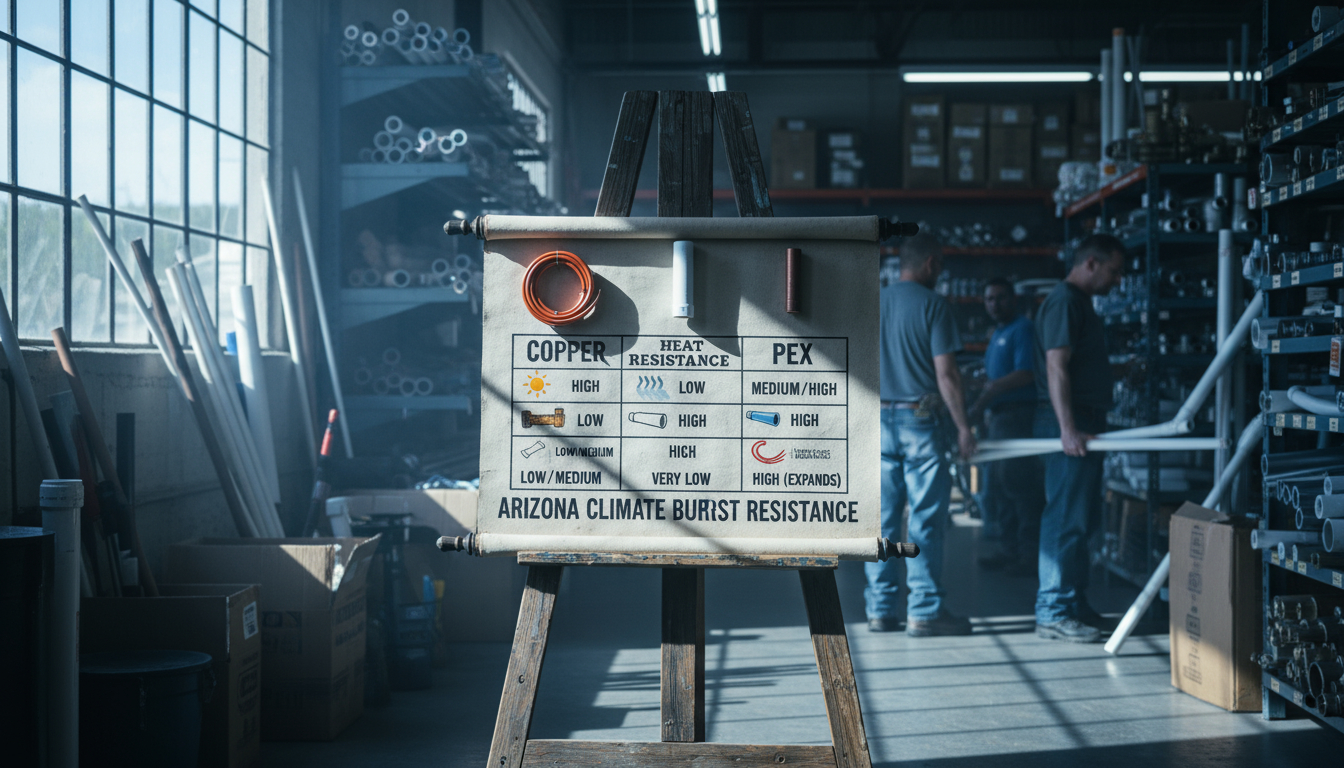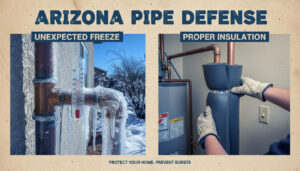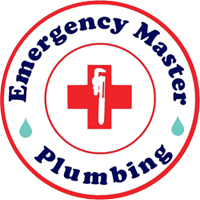

Burst pipes can lead to significant water damage, costly repairs, and disruptions in Arizona homes, especially during unexpected winter cold snaps. Understanding the root causes and implementing targeted prevention measures is essential for homeowners in this desert climate to safeguard their plumbing systems. This guide explores the common triggers behind pipe bursts, Arizona-specific risks, early warning signs, and practical prevention steps, empowering you to protect your property effectively.
Understanding Burst Pipes
Burst pipes occur when excessive pressure or structural weakness causes plumbing lines to rupture, releasing water and potentially flooding interiors. In Arizona, where temperatures can plummet below freezing at night even in mild winters, this issue strikes unexpectedly, affecting homes with uninsulated or exposed pipes. The expansion of freezing water inside pipes generates immense force—up to 9,000 pounds per square inch—far exceeding the strength of most materials like copper or PVC. Homeowners often overlook this risk in a state known for heat, but recent cold fronts have highlighted the vulnerability, with incidents rising during dips below 32°F. Addressing these bursts promptly prevents mold growth, structural damage, and health hazards from standing water.
Common Causes of Burst Pipes in Arizona
Arizona’s plumbing systems face unique stressors from its arid environment, hard water, and temperature swings, leading to frequent pipe failures. Identifying these causes allows for proactive maintenance to avoid emergencies.
Freezing Temperatures
The primary culprit for burst pipes in Arizona is sudden freezing, where water inside pipes turns to ice and expands, cracking the surrounding material. Even though Arizona winters are generally mild, nighttime lows in the low 20s or high teens during cold snaps—common in areas like Phoenix and Tucson—pose a real threat to unheated spaces. Pipes along exterior walls, in attics, or garages are most susceptible, as the ice blockage traps expanding water and builds pressure until rupture. Statistics from local plumbers show that frozen pipe incidents spike 30-50% during rare freeze warnings, underscoring the need for vigilance in this region.

Aging and Corrosion
Older pipes, particularly those installed before the 1970s, degrade over time due to corrosion from Arizona’s mineral-rich hard water, which contains high levels of calcium and magnesium. This buildup thins pipe walls, making them brittle and prone to bursting under normal pressure. Galvanized steel pipes common in vintage homes rust internally, while copper lines suffer from pH imbalances in local water supplies. In Phoenix metro areas, where many residences date back decades, corrosion accounts for up to 40% of non-freeze-related bursts, often undetected until failure.
High Water Pressure
Excessive water pressure, often exceeding the recommended 80 psi in Arizona homes, strains pipes and fittings, leading to leaks or bursts over time. Municipal systems or faulty pressure regulators can push water force too high, especially in elevated terrains around Tucson or Flagstaff. This issue worsens with clogs or partial blockages, amplifying force in vulnerable sections. Homeowners may notice sputtering faucets as an early indicator before a full rupture occurs.
Physical Damage and Poor Installation
Accidental impacts during renovations, like drilling into walls or landscaping, can puncture or weaken pipes, setting the stage for bursts. Similarly, substandard installations—such as loose joints or unsupported runs—create stress points that fail under daily use or thermal expansion. In Arizona’s expansive homes with long pipe runs, these flaws compound with ground shifts from dry soil contraction.
Other Factors Like Clogs and Tree Roots
Blockages from sediment or debris increase internal pressure, mimicking high-flow conditions that burst weakened pipes. Tree roots invading sewer lines, common in Arizona’s irrigated yards, exert external force and crack pipes, particularly in clay soil areas. These less obvious causes contribute to 20% of incidents, often requiring professional inspection.
Arizona’s Unique Challenges
Arizona’s desert climate amplifies pipe burst risks through hard water mineralization and rapid temperature fluctuations, unlike more temperate regions. Winters bring dry cold that seeps into uninsulated attics and crawl spaces, freezing pipes faster than in humid areas. Hard water accelerates scale buildup, reducing pipe diameter and efficiency, while summer heat causes thermal expansion that stresses joints. Urban growth in Phoenix has strained older infrastructure, with many homes lacking modern safeguards against these environmental factors. Recent data indicates that Arizona sees 15-20% more plumbing failures than the national average due to these combined elements.
Signs of Potential Burst Pipes
Early detection of pipe issues can prevent disasters; watch for reduced water flow, unusual noises like banging or whistling from pipes, or visible water spots on walls and ceilings. In Arizona, frost on exposed pipes during cold mornings signals imminent freezing. Discolored water or sudden pressure drops often indicate corrosion or clogs building toward a burst. Addressing these promptly through inspection averts widespread damage.
Effective Prevention Strategies for Arizona Homes
Preventing burst pipes requires simple, consistent actions tailored to Arizona’s conditions, focusing on insulation, maintenance, and awareness during winter. These steps can reduce risk by up to 90% when applied diligently.
Insulate Vulnerable Pipes
Wrap exposed pipes in attics, basements, and near exterior walls with foam sleeves or fiberglass insulation to retain heat and block cold air. In Arizona, prioritize unheated areas where temperatures drop quickly; heat tape or cables provide extra protection for long runs. This measure is cost-effective, often paying for itself by avoiding repair bills averaging $5,000 per incident.
Maintain Indoor Temperatures
Keep your thermostat at least 55°F, even overnight or when away, to ensure warm air circulates around plumbing. Open cabinet doors under sinks to expose pipes to room heat, a simple trick effective during Arizona’s brief freezes. Avoid drastic thermostat drops, as they create cold pockets in walls.
Allow Water to Drip and Seal Gaps
During forecasted freezes below 32°F, let faucets drip slightly—hot and cold—to keep water moving and prevent ice formation. Seal drafts around windows, doors, and plumbing penetrations with caulk or weatherstripping to block chilly desert air. This is crucial in Arizona’s low-humidity winters, where cold penetrates easily.
Disconnect Outdoor Fixtures and Schedule Maintenance
Shut off and drain outdoor hoses and faucets before winter, using insulating covers for spigots. Annual professional inspections detect corrosion, pressure issues, or weak spots early, especially beneficial in hard-water zones like Phoenix. Install a pressure regulator if your home exceeds 80 psi.
Prepare for Absences
If leaving for more than a day during cold weather, shut off the main water valve and drain lines by flushing faucets and toilets. This eliminates standing water vulnerable to freezing.
What to Do If a Pipe Bursts
If you suspect a burst—evidenced by no water pressure, visible leaks, or flooding—immediately shut off the main water supply to minimize damage. Avoid using drains or electrical outlets in affected areas to prevent hazards. Then, contact a licensed plumber for repair; in Arizona, professionals use advanced leak detection to isolate and fix issues quickly. Dry the area thoroughly to prevent mold, and document damage for insurance claims. Acting within the first hour can limit costs significantly.
In conclusion, burst pipes in Arizona stem largely from freezing, corrosion, and pressure issues, but prevention through insulation, maintenance, and winter prep keeps homes safe. By staying proactive, homeowners avoid the financial and emotional toll of water damage.
For expert plumbing services in Arizona, including burst pipe prevention and emergency repairs, contact Emergency Master Plumbing & Air at 623-584-4706. Their experienced team specializes in local solutions to keep your systems reliable year-round.
